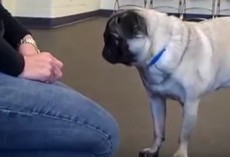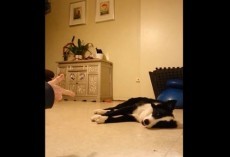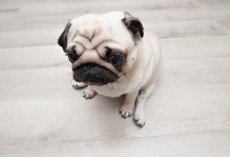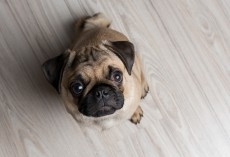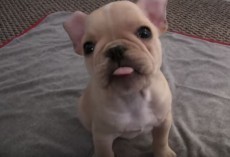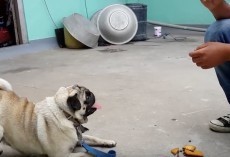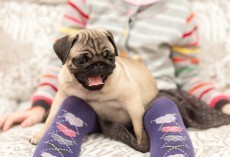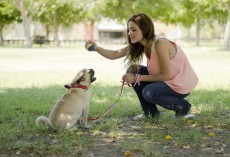Take a look at your home. How is it set up? Do you have smaller areas, like a bathroom or kitchen, that you can section off for your four legged friend? Survey your personal space and thinking about small areas, how they can be secured (with a small doggie gate, or a few boxes, etc) and how clear the visibility is. For example, can you easily monitor them in your bathroom?
1. Confine your puppy to a certain area in the apartment. You can gate off your kitchen using a child or dog gate or choose a different room. This is necessary during the first few months, since keeping your puppy in one place allows you to keep an eye on her so you can take her outside right away when she shows signs of needing to relieve herself. If she has too much freedom, she'll end up going to the bathroom before you can catch her to take her outside.
- Your puppy is ready to spend time in the rest of the apartment after she has learned to signal to you that she needs to go outside, either by moving toward the door or looking at it. You'll also know she's ready when she has very few accidents in the apartment.
Consider having an indoor bathroom spot. If your apartment is on a high floor in your building, it might be difficult to get outside in time for your puppy to go to the bathroom. If you have a small dog who makes manageable messes, you can consider paper training your dog instead of taking her outside every time. Line an area of the room with newspapers or special training pads you can buy at the pet store. Use the same training method you'd use for an outdoor bathroom spot, carrying your puppy to the papers each time she has to go. Reward her when she goes successfully.
- You can also use a sod box as a place for your puppy to eliminate. Fill a shallow plastic container with sod or dog litter, and place it on top of newspapers.[3]
- When you clean up after an accident your puppy has had, you can place the soiled paper towels or rags in the designated area so that your puppy associates the the smell of urine with her bathroom spot.
3. Keep your puppy in a crate at night and while you're away. Puppies actually like the feeling of being in a small, cozy crate – it makes them feel safe and secure. For this reason you should never use a crate as a form of punishment; it should be your puppy's personal safe place. Puppies don't like soiling their living space, so make sure you take your puppy outside so she can go to the bathroom right before you put her in the crate.
- Puppies can sleep for about 4 hours before they need to relieve themselves. Very young puppies might wake up barking, though, so you should line the crate with towels just in case your puppy has an accident in the night.
- If you hear your puppy barking in the crate, take her outside to relieve herself and place her back in the crate. Be sure you reward her when she relieves herself.
4. Clean up accidents right away. If your puppy has an accident in her crate or elsewhere inside, be sure to clean it up and sanitize the spot so it no longer smells like urine. If an area smells like urine the puppy will instinctively want to relieve herself in the same spot again.
5. Don't scold your puppy for having an accident.[4] Puppies don't respond well to negative reinforcement; it only makes them afraid. If your puppy is relieving herself in your apartment, pick her up and immediately take her outside to the designated bathroom spot. When she successfully finishes doing her business there, reward her before taking her back inside.
- Never yell at your puppy or spank her when you see her having an accident. You will teach your puppy to be afraid of you, and it won't help her learn what to do when she needs to relieve herself.
- If you find a mess in your apartment after the deed has been done, don't ever rub your puppy's nose in it or try to discipline her. It doesn't work; it just confuses the puppy. Simply clean up the mess and take the puppy outside more often to continue her training.
Such great potty training tips from the team over at Wiki How. For additional tips on creating an outdoor routine for your pooch, be sure to check out the complete article here.
We understand that potty training can take a toll on a persons patience level. But remember, your dog isn't intentionally trying to do bad things. There is a learning curve! Puppies are brand new at this, so give them time to develop the potty training skill. Adult dogs can also experience a learning curve. Maybe you adopted an older dog from a shelter. Just keep in mind that their previous owners may not have trained them properly. Or maybe they've always had access to a backyard, this is a common learning curve for re-homed dogs. And lastly, dogs can get anxious. They wont to please their owners and they feel good when their owners are happy. But coming into a new home, as exciting as it is, can also seem awkward for a new pet. They want to follow your rules and be your best friend, you just have to have the love and patience to show them how.

